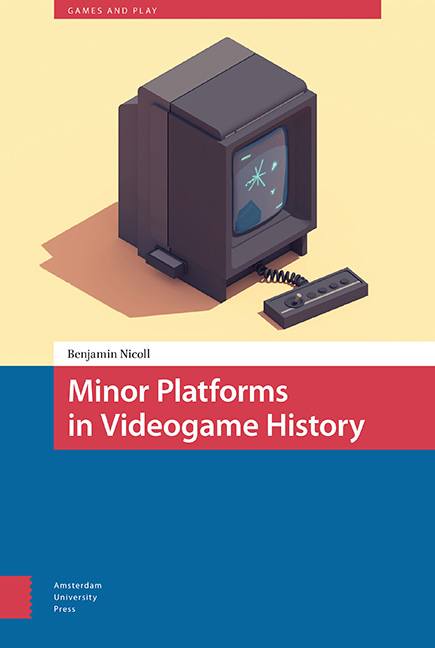Book contents
- Frontmatter
- Contents
- List of Tables and Figures
- Acknowledgements
- Introduction : Failed, Forgotten, or Overlooked? Methods for Historicizing Minor Platforms
- 1 Ways of Seeing Videogame History: The Vectrex as a Transitional Platform
- 2 Articulations of Videogame Piracy: The Zemmix as a Decolonial Platform
- 3 Domesticating the Arcade: The Neo Geo as an Imaginary Platform
- 4 A Dialectic of Obsolescence? The Sega Saturn as a Residual Platform
- 5 ‘How History Arrives’: Twine as a Minor Platform
- Conclusion: ‘Something new in the Old’
- Index
4 - A Dialectic of Obsolescence? The Sega Saturn as a Residual Platform
Published online by Cambridge University Press: 21 November 2020
- Frontmatter
- Contents
- List of Tables and Figures
- Acknowledgements
- Introduction : Failed, Forgotten, or Overlooked? Methods for Historicizing Minor Platforms
- 1 Ways of Seeing Videogame History: The Vectrex as a Transitional Platform
- 2 Articulations of Videogame Piracy: The Zemmix as a Decolonial Platform
- 3 Domesticating the Arcade: The Neo Geo as an Imaginary Platform
- 4 A Dialectic of Obsolescence? The Sega Saturn as a Residual Platform
- 5 ‘How History Arrives’: Twine as a Minor Platform
- Conclusion: ‘Something new in the Old’
- Index
Summary
Abstract
This chapter looks at how the imaginaries surrounding a commercially obsolesced ‘cult’ platform—the Sega Saturn—are reactivated and imbued with ‘residual’ value in the present. It takes as its starting point the media archaeological idea that obsolesced technologies, once liberated from their commercial contexts, are freed up for aesthetic experimentation. I argue that this media archaeological ‘impulse’ is often shot through with a ‘dialectic of obsolescence’ that hesitates between wanting to fetishize and salvage media history. In order to unpick this dialectic, I analyse the residual afterlife of the Sega Saturn's cancelled ‘flagship’ title, Sonic X-treme, by looking at fan attempts to revive the videogame in the present.
Keywords: archives, obsolescence, vapourware, fan revival, Sega, nostalgia
In the introduction to this book, I discussed media archaeology as an approach to historical description that, broadly defined, rejects teleology in favour of a ‘non-linear’ conception of media history. Media archaeology is, however, often shot through with a contradictory desire to make both a ‘poetics’ and ‘fetish’ of obsolesced technologies (cf. Elsaessser, 2016: 47). That is, media archaeology is motivated on the one hand by something of a ‘disinterested’ aesthetic impulse to liberate outmoded technologies from the grip of planned obsolescence (Elsaesser, 2016: 335). Practitioners of media archaeology—be they researchers or artists—often seek to ascribe aesthetic value to technologies no longer defined by their economic utility but instead by their apparent uselessness. Yet, on the other hand, media archaeology often ‘digs up’ ostensibly weird and forgotten technologies without adequately justifying its methodological and analytical purposes for doing so (cf. Nooney, 2013). Thomas Elsaesser (2016: 354) argues that media archaeology's propensity to ‘go against the grain’ of history is a symptom of and response to the dizzying pace of technological development in the present. He writes,
media archaeology, despite the brave calls for going against the grain, for making a last stand against the tyranny of the new, for digging into the past in order to discover there an as yet unrealized future, nonetheless does not escape our culture's most prominent pathology: the need to preserve the past, to fetishize ‘memory’ and ‘materiality’ in the form of trauma and loss, even as we lose faith in history and make our lives every [sic] more dependent on the ‘virtual’.
- Type
- Chapter
- Information
- Minor Platforms in Videogame History , pp. 133 - 156Publisher: Amsterdam University PressPrint publication year: 2019
- 1
- Cited by



